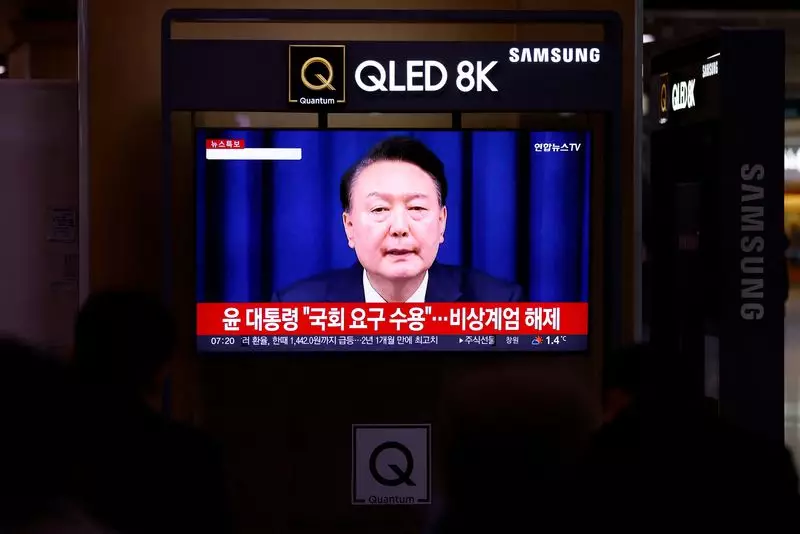South Korea, a nation known for its dynamic economy and tech-savvy populace, finds itself ensnared in significant political turmoil. On a recent Wednesday, the South Korean stock market faced sharp declines amidst the fallout from President Yoon Suk Yeol’s abrupt declaration of martial law—an announcement he rescinded just hours later. This unexpected maneuver has not only rattled the nation’s political landscape but has also led to pronounced volatility in financial markets, shedding light on how political developments can greatly influence economic stability.
Following President Yoon’s contradictory actions, South Korean shares plummeted, with the benchmark Kospi Index suffering a nearly two percent loss. The South Korean won reached a two-year low before showing signs of stabilization. This emotional sell-off in the markets illustrates how fragile investor confidence can be amid uncertainty. Market participants expressed profound concern. One portfolio manager from Asia Dividend Income described the political situation as a risky game that has already produced unfavorable outcomes. Despite the relatively lower valuation of South Korean assets, the risks associated with potential political upheaval are deterring foreign investment.
The sentiment reflected in the market is indicative of what is often termed the “Korean discount,” a phenomenon that perceives South Korean assets as carrying higher risks compared to their international counterparts. Investors have long been wary of political instability, which may diminish South Korea’s appeal as a stable investment destination. Given this context, some analysts are looking more positively towards markets in China, suggesting that South Korea’s political issues may lead to a reallocation of investment capital into seemingly more stable environments.
As the markets weather the aftermath of President Yoon’s actions, analysts point to an increased risk premium currently associated with South Korean assets. The valuation of South Korea’s KOSPI at 0.8 times its one-year forward estimated book value starkly contrasts with the MSCI World Index, which trades closer to three times. This discrepancy illustrates a broader concern among investors about the potential for future instability and the inherent risks involved in investing in Korean equities and currencies.
While some believe this increased risk premium may lead to further selloffs, others posit that with ongoing commitments from both the South Korean government and the Bank of Korea (BOK) to bolster liquidity, drastic market declines might be tempered. The overarching sentiment seems to lean toward the belief that, as long as liquidity remains robust, the potential for a significant market crash may be mitigated.
In response to this unique situation, the role of the Bank of Korea is paramount. Analysts have noted the weakening domestic demand and have predictively continued hawkish stances will have to transition towards easing measures. The BOK’s strategy could include direct interventions to stabilize the currency if they observe drastic shifts in market dynamics. The political backdrop further complicates these interventions, as uncertainty surrounding leadership changes could provoke additional challenges for monetary policy.
Frances Cheung from OCBC Bank commented on the immediate market reaction, suggesting that the spike in the USD/KRW exchange rate was a knee-jerk response to the presidential announcement. On a broader scale, while the BOK’s liquidity measures may provide some alleviation, the political instability could persist as a factor in shaping investors’ outlook on the currency and broader economic landscape.
While short-term volatility appears inevitable, long-term impacts of political upheavals on the South Korean economy remain complex. Observers suggest that domestic political tensions do not always result in long-term adverse effects, particularly if currency valuations stabilize. However, caution is advisable, especially with the potential for broader economic challenges influenced by international dynamics—including trade tensions and upcoming shifts in U.S. policy.
Market participants express a need to remain vigilant. David Chao from Invesco noted the evolving nature of the situation and hinted at the possibility of ongoing volatility. As investors navigate these turbulent times, there is a palpable sense of wariness that underscores the delicate interplay between politics and economic performance in South Korea.
The recent political crisis surrounding President Yoon Suk Yeol has inflicted immediate repercussions on South Korean markets, leaving both investors and analysts grappling with uncertainty. The situation exemplifies how political developments can ripple through financial markets, generating both immediate selloffs and longer-term caution. As citizens and policymakers confront this crisis, the unfolding narrative will continue to shape economic perceptions about South Korea’s stability and investment potential in the coming months.

